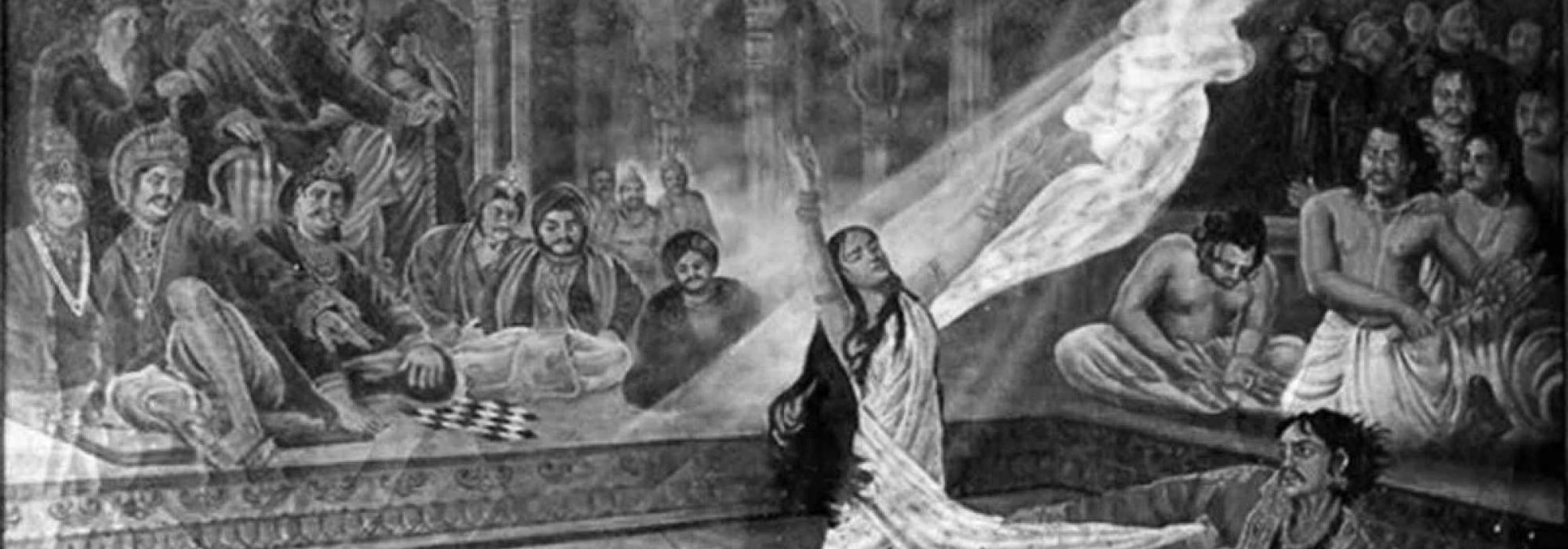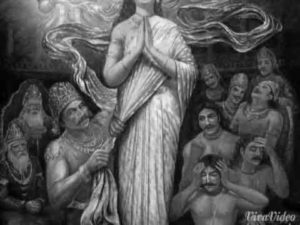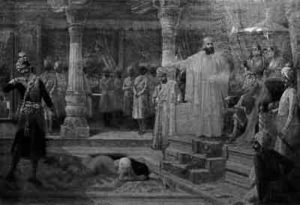Duśśāsana pulled Draupadī’s garment and taunted her in vulgar language, even as she lamented, looking helplessly at the pale faces of her husbands. Her garment was dropping off her shoulder. Looking at this, Bhīma was greatly pained and told Dharmarāja in a furious tone, “O King! Gamblers never go to the extent of pledging their servants out of compassion for them. The Kauravas, through deception, have won over everything that was in our possession – the treasures that the king of Kāśi had offered to us as a sign of respect, our chariots, our weapons, and the entire kingdom. They haven’t spared even you and your brothers. None of this angers me because you are the lord of all. But it was not right to pledge Draupadī in the game of dice. She does not deserve such treatment at all. Having married the Pāṇḍavas she is undergoing so much of pain. Why should she be subject to humiliation at the hands of the Kauravas? This has enraged me and I’m terribly angry with you. Sahadeva! Get some fire. Let us burn both his hands!”
Arjuna said, “Bhīma! I’ve never heard you speak like this before! It appears that you ’ve lost your dhārmic conduct because of the cruelty of the Kauravas. Please don’t give up dharma! Don’t override the words of our elder brother—Dharmarāja—who always abides by dharma. They called us for a gamble and we had to accept their invitation as per the Kṣatriya-dharma. It certainly brings us good reputation as we did not turn down their invitation!” Bhīmasena replied, “I know all that, Arjuna!” As Pāṇḍavas were engaged in a verbal feud and Draupadī continued to cry in pain, Vikarṇa, the son of Dhṛtarāṣṭra addressed the people present in the court: “Revered kings! Reply to the questions posed by Yājñasenī. Bhīṣma, the oldest of the Kurus; Dhṛtarāṣṭra; Vidura, the wise one; Droṇa and Kṛpa, the ācāryas – all have chosen to remain silent! Let us abandon lust and anger and speak out our minds.” No one reacted to Vikarṇa’s words. He squeezed his hands in despair and said with a sigh, “It does not matter to me whether you all choose to speak or not; I shall speak whatever I think is dharma: The learned say that hunting, addiction to liquor, gambling, and falling prey to baser instincts are the four major vices of all kings. A king who has taken to such vices will forego the path of dharma. His acts are never revered by the world; Yudhiṣṭhira accepted the invitation to gamble and even pledged Draupadī in it. Moreover, she is the wife of all the Pāṇḍavas. Yudhiṣṭhira pledged her after having lost himself to the Kauravas. Śakuni instigated Yudhiṣṭhira to do so. Taking all of this into consideration, I have come to the conclusion that she cannot be a slave to the Kauravas.” The people assembled in court heard his words and started hailing him. They also condemned the acts of Śakuni.
Once the commotion had come down, an angry Karṇa flexed his arms and said, “There are too many faults and inconsistencies in what Vikarṇa has spoken. Just as fire, born out of a wooden stick burns it, Vikarṇa has set fire to the house in which he was born. Everyone else has remained silent, choosing not to comment, as they are convinced that Draupadī was won over by us in a dhārmic manner. Vikarṇa! You are still a young child and yet you speak like an elder – that is merely your mischief. You say that Draupadī was not won over by us in the gamble. Do you know dharma? While you say that Yudhiṣṭhira lost everything that belonged to him, how do you say that Draupadī was not lost too? Isn’t Draupadī one of the things in the ‘everything’ he has lost? Śakuni has won over the wealth of the Pāṇḍavas, the five brothers, and Draupadī in a dhārmic manner. Duśśāsana! Though a boy, this Vikarṇa speaks with the tone of a superior. Snatch away the clothes that the Pāṇḍavas and Draupadī are wearing!’ Hearing these words, the Pāṇḍavas threw away their upper garment. As Duśśāsana tried to pull Draupadī’s saree, there appeared another saree of the same of the same kind to take its place. He pulled that out too and one more of a similar kind appeared. As he pulled the sarees one after another, newer ones kept coming. There was a huge commotion in the court as the kings watched this astonishing scene. Bhīma stood amidst them and was boiling with rage. With his quivering lips, he shouted, “Kṣatriyas! Listen to my words! No one has spoken words like this in the past and there will be no one in the future who can speak so. If I don’t act as per my words, may I never reach the heavens that my ancestors have attained! I shall tear open the evil Duśśāsana’s chest and suck out his blood!” He vowed to carry out his words, under any circumstances.
There was an endless manifestation of Draupadī’s sarees and Duśśāsana got tried to trying to disrobe her. He felt humiliated as his efforts turned out to be futile. There was a heap of sarees fallen in the court. Everyone rebuked him and appreciated Bhīma. They criticised the Kauravas for not answering the questions Draupadī had posed and disapproved of Dhṛtarāṣṭra’s behaviour. The wise Vidura stood up, waved his hands trying to bring the court under control and said, “Dear all! Draupadī is crying like an orphan and is seeking help. No one is caring to reply to her questions under the current circumstances. These are questions of dharma and the way of dharma is subtle. It is the duty of the court to provide justice and take care of the needy. When a question related to dharma is posed, people in power should answer it without getting carried away by emotion. They should answer the question in an unbiased manner without being subject to lust, greed, and anger. Vikarṇa said whatever he felt was right. You all may feel free to speak your mind too, just as he did. If people who know dharma remain silent, it is as good as telling a half-life. If your answers sound irresponsible, it is as good as speaking an absolute lie. Please give suitable answers to the questions Draupadī has posed!” And yet, no one replied. Draupadī addressed the gathering, “Look! My salutations to this assembly! I should have done this long back. As the wretched fellow was dragging me with force, I was unable to offer my salutations before.” With these words, she collapsed on the floor in sorrow. She cried uncontrollably. “No one else other than the kings who had come for my svayaṃvara had seen me. When I was at home, even the Sun and the Wind had not seen me. Now I’m standing here in the middle of this assembly, helpless. The Pāṇḍavas could not tolerate it even if a wind blew past me. But now they remain silent even as they see me getting dragged by the evil one. The Kauravas are quiet while their daughter-in-law is suffering. This is certainly due to the play of Time. What can be more pitiable than a noble lady like me standing here in the court? Where has the dharma of kings vanished? I am the wife of the Pāṇḍavas, the sister of Dhṛṣṭadyumna, and friend of Vāsudeva – should I be dragged into the court? Kauravas! You decide and tell me – am I a dāsī or not. I shall act as per your word. This wretched fellow is pulling my garment. I will not be able to put up with it for long!”
Bhīṣma said, “Dear child! The working of dharma is subtle and hard to understand. Even the learned ones find it difficult to understand. I have said this before too. Whatever the strongest one in the world considers to be dharma, stands as dharma forever. Your question is indeed profound, deep and subtle. I will not be able to answer this even if I put in a lot of thought. One this is for certain – the Kuru lineage is nearing its end. It is probably for this reason that the Kauravas are being driven by greed and lust. A person like you, who is born in a good family and is dhārmic in conduct will never forego dharma, even when faced with the most intense of sorrows. Droṇa and the others who are well-versed in dharma sit here with lifeless bodies. In my view, only Yudhiṣṭhira can resolve the issue. He should tell us if he has lost you in the game.” Hearing this, Duryodhana said, “Put aside Yājñasenī’s question for a moment. Let your husbands – Bhīma, Arjuna, Nakula, and Sahadeva say that they have no right over you. Or let Yudhiṣṭhira utter this. People assembled here have chosen to remain silent because they know that Pāṇḍavas don’t have fortune on their side and have lost everything!” People who were silent until now out of their fear for him, now started lauding his words. They turned towards Dharmarāja and the other Pāṇḍavas and curiously waited to see what they would say. Bhīma said, “If Dharmarāja were not to be the head of our family, we would never have tolerated so much of injustice. He is equally responsible for our lives and virtues. If he considers himself lost, it means that we are all lost too. If not, who can escape from my powerful arms, after having touched Draupadī’s hair? I have brought myself under control as I am bound by dharma, out of respect for my elder brother and having been stopped by Arjuna. If Dharmarāja permits me, I shall kill these sinful Kauravas just as a lion kills other animals!” He patted his biceps as he said these words. Bhīṣma, Droṇa, and Vidura came in his way and stopped him. They said, “Bhīmasena! We know that you are capable of all this and much more. Please control yourself!” Karṇa spoke next. “These three don’t understand that she is now our slave and we can use her the way we want. We are your lords. Come, walk into our homes now. You can help in the household chores. Get married to a person who will not lose you in a gamble! As the Pāṇḍavas are now our slaves too, they are no longer your husbands. Can we consider Dharmarāja as someone who knows your value, after he has pledged you for gamble? Should we consider him a courageous person?” Bhīma’s anger was again kindled and he was about to erupt. But he tolerated it all and let out a sigh.
To be continued…
This is an English translation of Prof. A R Krishna Shastri’s Kannada classic Vacanabhārata by Arjun Bharadwaj and Hari Ravikumar published in a serialized form. Thanks to Śatāvadhāni Dr. R Ganesh for his thorough review and astute feedback. Additional segments from the epic and notes by the translators have been added in the footnotes after going through the Critical Text of the Mahābhārata.



















































